
1. Keep Sentences Short and Direct
Clarity is key in writing. One of the easiest ways to improve readability is by using shorter sentences. Long, complex sentences can confuse readers. Instead, stick to concise sentences that get straight to the point. This technique also helps to hold your reader’s attention, making your content easy to follow.
For example:
Instead of saying, “Due to the fact that it was raining, we decided to stay inside and watch a movie,” simplify it to, “It was raining, so we stayed in and watched a movie.”
2. Choose Active Verbs
Active verbs energize your writing and give it a strong, clear tone. Avoid phrases like “was doing,” “is going,” or “will be completed.” These slow down the flow of your writing. Stick to action-packed verbs that move your writing forward.
For example:
Instead of saying, “The report was written by the team,” try “The team wrote the report.” This structure makes your writing more engaging.
3. Break Up Your Paragraphs
Nobody likes reading walls of text. To keep readers engaged, break up your content into shorter paragraphs. Even if you have a lot to say on a subject, try to divide your information into easily digestible chunks. This makes your writing visually appealing and less intimidating.
If you’re working on an article, like this one, notice how each point is its own short paragraph. This helps readers scan through the key ideas.
4. Avoid Overly Complicated Words
Good writing isn’t about showing off your vocabulary. It’s about communicating effectively. Using simple words helps make your writing clearer. If your reader has to stop and look up a word, you risk losing their attention. Stick to everyday language that everyone can understand.
For example:
Instead of “utilize,” just say “use.” Instead of “commence,” say “start.”
5. Be Specific
General statements are easy to write but don’t carry much weight. Being specific adds depth to your writing and makes it more interesting. Use specific details to paint a clear picture in your reader’s mind.
For example:
Instead of saying, “The weather was bad,” say, “The storm pounded the windows, and the wind howled through the streets.”
6. Read Aloud to Catch Mistakes
What you get when you avoid proofreading is that you are likely to overlook certain mistakes especially if you are reading the content in silence. This is where you read your work out loud, as it may help you notice some things you did not before. Your words can also be effective in revealing that in your sentences you may have overextended your ideas or expressed them unclear or awkwardly.
One of the effective ways of checking into the fluency of our written content is by reading them aloud to ourselves.
7. Practice Consistent Tone and Style
Regardless of the type of writing that you are doing, the rule of thumb is to be consistent. It is advised that one should maintain the same respective tone and style throughout the piece. You shouldn’t go from conversational, to formal in the middle of the passage, either. I can remember feeling more confident in the writing because having a consistent tone also makes it sound more professional.
8. Use Tools Wisely
There is no shortage of applications that can assist with writing and one can use a grammar checking tool or hire an AI tool. One such tool which is getting popular is the AI voice cloning. Although it has no direct connection with conventional writing, it will enable you to produce natural-sounding voice renditions of your writing. You might feel like you’re listening to your favorite bedtime story when you listen to someone else read your article out loud using your voice. This feature can be of great use to provide the audience with the objective view of the content and determine whether the given text sounds good when read aloud.
Using this technology you can record only a small segment of your voice, then the tool can synthesize a natural-sounding clone. This helps in making podcasts or video narrations without having to say ever word that is to be said.
9. Keep Your Reader in Mind
Writing is not, therefore, about what the writer has to say but what the reader has to be told. However, always put the audience into consideration each time you are writing. Is it a reader that needs entertainment, a businessman or someone who needs an extensive guide? It would be wise to adapt the way you write, as well as the content and texture of your message.
For instance, if one is writing an article to help writers who are new to writing, then, do not use technical writing terms. However, where a formal presentation of the theories is deemed necessary, do so in a manner that addresses their level of understanding.
10. Edit Ruthlessly
The best writers know that good writing is rewriting. After you finish your first draft, take time to go through it again. Cut out unnecessary words, clarify your points, and smooth out rough spots. If something doesn’t add value to your writing, cut it. This process can transform average writing into polished, professional work.
Focus on eliminating wordiness, repetitive phrases, and vague language. The more concise you are, the stronger your writing becomes.
11. Avoid Repetition
Repetition is one of the easiest ways to bore your readers. It can sneak into your writing without you noticing. Be careful not to use the same word or phrase multiple times in a short span. Look for synonyms or rephrase your sentences to keep your writing fresh and engaging.
For example:
Instead of saying, “He was tired. He was very tired from working all day,” try, “He was exhausted after working all day.”
12. Stay Focused
When you’re writing, it’s easy to get off track. Stay focused on your main message, and avoid straying into unrelated topics. If you start discussing something that doesn’t directly support your main point, cut it out. Keeping your content on-topic will make your writing tighter and more effective.
Conclusion
Getting to that perfect writing condition does not need any major transformation. That is why, using such pieces of advice as avoiding long sentences, using active voice, and maintaining a proper writing tone, you can boost your writing skill in a short time. I would always like to remind everyone that good writing is all about passing on information clearly. Regardless of whether you are writing a blog entry, e-mail, or a business proposal you must keep yourself on track and edit scrupulously so as to produce an efficient message.
If you have wondered how to use AI for voice cloning this is a great way to bring your content to life. Whether it is to gain the externality that comes with the actual physical sounding of one’s works or to record a voice over for a specific project, the various AI paraphernalia are quite useful and beneficial while you hone your writing skills. So, the more you practice, the more you stick to it, and one day your writing will be excellent than before.
The post Quick English Tips to Sharpen Your Writing Skills first appeared on Helena Daily English.]]>Well, it’s time to look at the most often used misinterpretations of grammar and how to avoid them, now.

1. Confusing “Your” and “You’re”
This is one of the most common errors, and it can easily confuse readers.
- Your is a possessive adjective. It refers to something that belongs to you. For example, “Is this your phone?”
- You’re is a contraction for “you are.” For example, “You’re going to love this movie.”
Quick Fix: When in doubt, read the sentence out loud. If “you are” doesn’t fit, then you need “your.”
2. Misusing “Their,” “They’re,” and “There”
These three words sound the same but have different meanings.
- Their is possessive, meaning it belongs to them. Example: “Their car is fast.”
- They’re is a contraction for “they are.” Example: “They’re leaving soon.”
- There refers to a place or is used to introduce something. Example: “The book is over there.”
Quick Fix: Remember this:
- Their = ownership
- They’re = they are
- There = a location
3. Its vs. It’s
The confusion here comes from contractions.
- Its is possessive. Example: “The cat licked its paw.”
- It’s is a contraction of “it is.” Example: “It’s raining outside.”
Quick Fix: If you can replace “it’s” with “it is,” then you’ve got it right.
4. Apostrophes: When to Use Them
Apostrophes are tricky for many people. The most common misuse is adding them where they don’t belong.
- Use apostrophes for contractions (can’t, don’t, won’t).
- Use apostrophes to show possession (John’s book, the dog’s toy).
Quick Fix: Never use apostrophes to make a word plural. For example, “apple’s” is wrong when you mean more than one apple.
5. Run-on Sentences
Run-on sentences happen when you join two or more independent clauses without the right punctuation.
For example, “I love writing it’s a great way to express ideas” should be “I love writing; it’s a great way to express ideas.”
Quick Fix: Split your sentences with a period, comma, or semicolon to keep ideas clear.
6. Using “Then” vs. “Than”
These words are often confused, but they’re quite different.
- Then refers to time. Example: “We’ll go to the store, then we’ll get lunch.”
- Than is used for comparisons. Example: “I like pizza more than pasta.”
Quick Fix: If you’re talking about time, use “then.” For comparisons, use “than.”
7. Subject-Verb Agreement
The subject of your sentence must agree with the verb in both number and person.
For example:
- Incorrect: “The team are winning.”
- Correct: “The team is winning.”
Quick Fix: Pay attention to whether the subject is singular or plural. If the subject is singular, the verb should be too.
8. Comma Splices
A comma splice happens when you use a comma to connect two independent clauses. For example, “I love grammar, I read about it often.”
Quick Fix: You can fix this error by replacing the comma with a period, adding a conjunction, or using a semicolon.
9. Mixing Up “Affect” and “Effect”
This is a classic grammar mistake.
- Affect is usually a verb, meaning to influence something. Example: “The weather will affect our plans.”
- Effect is a noun, referring to the result of something. Example: “The effect of the storm was severe.”
Quick Fix: Think of “affect” as an action and “effect” as an outcome.
10. How AI Can Help with Grammar
Since grammar is a crucial component of speech, a lot of learners use aids to help them with writing. This free AI voice generator should make it easier to spot mistakes since you can listen to your sentences being read out loud. Someone else reading your paper is good as it makes you hear what you have written and this may help in recognizing some of these errors especially the ones found in awkward phrases.
And let me remind you that no one is born a writer and during their development, everyone uses whatever is available help. In terms of proofing, whether it is minor or major tweaks and even structure, technology is your buddy to good writing.
11. How to Monetize Instagram with Quality Content
It is essential if you are trying to brand yourself on social media particularly the new social media platform known as Instagram. Violations here include having unclear or wrongly written captions as this makes you look unprofessional especially if you’re looking to make money using Instagram.
Correct grammar makes your followers engaged and trust you because every information they get from you is accurate. Whether it is a narrative or an advert or even a post, one mistake in grammar kills the impression you wanted to make and lowers your chances of success. It will be profitable to use good grammar as well as unique and interesting content when it comes to making income through social media.
12. Free AI Tools for Writing Assistance
Another useful feature is an AI voice generator which enables you to convert the text into rather realistic-sounding speech for free. It is particularly ideal to use for those who desire to come up with attractive materials with close to zero input. It will help you ensure that your messages, such as your YouTube videos, social media, or presentation, have a professional appeal.
Final Thoughts
There are many ways that you can enhance your grammar, and they don’t have to be difficult. However, focusing on such easily recognizable erroneous such as ‘your’ and ‘you’re’ or ‘affect’ and ‘effect’, you can easily shave off the rough edges on your writing. And combine it with AI tools such as a free AI voice generator to read your piece out loud. And let me remind you, that, if you want to expand and/or how to monetize instagram, it’s vital to be very clear with your audience.
Just make sure to keep these mistakes in your mind and eventually, it won’t be long before you are avoiding them. Good and concise grammar gives better outcomes – whether you are working on a social media post, an email, or a blog. I want to encourage you to carry on with the writing, then its grammar mistake will not be an issue.
The post Grammar Essentials: Common Mistakes and How to Fix Them Fast first appeared on Helena Daily English.]]>| 1. Get (married)
If you “get married”, you marry. Ex: We’re getting married next year.” |
2. Get (angry)
If you “get angry”, you become angry. Ex: I get angry when people take my things without asking.” |
3. Get dark
If it “gets dark”, it becomes dark. Ex: It’s getting dart. We should home.” |
| 4. Get lost
If you “gel lost”, you don’t know where you are. Ex: We got lost in the |
5. Get (worse)
If things “get worse”, they become worse. Ex: If my headache gets |
6. Get up
The time you “get up” is the time you get out of bed. Ex: I got up at 5am this |
| 7. Get dressed
If you “get dressed”, you put on clothes. Ex: I got dressed in just five minutes. |
8. Get out
If you get out of a car, you leave the car Ex: She got out of the car |
9. Get along with
If you “get along with” someone, you have a good relationship with them. Ex: I get along with my work |
| 10. Get home
The time you “get |
The best way to learn any words or expressions is being seen or hear them in context when you’re reading or listening to English.
Make a note of any words or expressions that you like (or want to learn) and write these down in sentences. Remember, always record language in phrases or sentences – never as individual words. You should also practice using the words or expressions as often as you can: in conversation, on the phone, in emails, etc.
The post How to use “GET” like a native English speaker first appeared on Helena Daily English.]]>Continuous practise leads to perfection
When it comes to learning English, “practise makes perfect” still holds true. The secret to developing your linguistic abilities is consistency. Spend a certain amount of time each day or week on it. Dedicate a set amount of time each day or week to practice English, whether it’s reading, writing, listening, or speaking. By doing so, you’ll make gradual progress and build up your confidence in using the language.
Use Authentic Materials
One effective way to improve your English language skills is by using authentic materials such as books, newspapers, podcasts, and movies. These materials expose you to real-life situations and help you become more familiar with English expressions, vocabulary, and grammar. In the best majors at UCLA, such as English, Communications, and Linguistics, using authentic materials can help you gain a deeper understanding of language and communication.
Speak English Regularly
Speaking English regularly is essential in improving your speaking skills. Find someone to practice speaking with, whether it’s a language exchange partner, a friend, or a tutor. Don’t be afraid to make mistakes; learning from your mistakes is an integral part of the learning process. In majors such as Business, Law, and Political Science, where communication is key, speaking English fluently and confidently is a vital skill.
Conclusion
In conclusion, learning English is crucial for enhancing your language abilities. You can steadily improve your language skills and develop your confidence by making time and effort to practise reading, writing, listening, and speaking. Your English language abilities can help you succeed academically and professionally in UCLA’s top programmes, where communication and language are essential components of the courses.
The post English Language Skills first appeared on Helena Daily English.]]>Hi everyone,
This lesson is about English, but not about how you can improve your English. No, I have made some. I give you some interesting facts about English, which may surprise you. While you read my lesson, you can practice your listening, and also, you can know more about the language you are learning. So, you may get surprised a lot, so let’s get started.
1. Shakespeare contributed more than 1000 new words to the English dictionary
There will be a lot of you who feel “hate” the writer William Shakespeare because he “accidentally” made learning vocabulary much more difficult. More than 1000 words he created and used in famous works are still used by people every day and saved in official dictionaries.
Some common words and phrases:
- Addiction: Being psychologically or physically dependent on something, usually a drug.
- Bedazzled: Blinded by something incredibly wonderful.
- Cold-blooded: Either an animal with cold blood (like a reptile) or a way to describe someone who’s cruel and indifferent to emotion.
- Swagger: To walk in a way that shows you’re boasting or disrespectful.
- Break the ice: To relieve the tension or silence in a conversation by talking.
2. British Empire and iPhone are the reason why English is widely spread around the world
Everyone knows that English is the most common language, but do you know the reason behind that story?
- Reason 1: From the late 15th century to the 17th century and the 1960s, Britain owned many colonies, stretching from Europe and North America to the countries of Africa and the West Indies. Of course, once you own a country, gradually the people of the colonized countries will have to learn English.
- Reason 2: The rise of the great power of the United States and the popularity of the Internet and the iPhone have made English available to almost every corner of the world.
3. Every 2 hours a new word is added to the dictionary
The curator of the Oxford English Dictionary once shared that there are about 4000 new English words a year, that is, every 2 hours there will be a new word.
4. There are about 1.5 billion people who speak English
It is estimated that about 20% of the world’s population knows and is using English, of which there are about 600-700 million foreigners.
5. The world’s most “massive” is English vocabulary store
As of 2019, the number of words one can count is 1 MILLION words. Sounds terrible, doesn’t it? But don’t be afraid, because…
6. On average, an English speaker only knows 20,000 – 30,000 words
You do not need to memorize all the other 1 million words, because statistics have shown that a person can only remember 20,000 – 30,000 English words and only need that to be able to communicate well.
7. “E” is the most used letter
And the least used letter is “Q”
8. The most used adjective is “good”
Good job, Good morning, Good evening, Very good,… are the catchphrases of English learners. Not surprisingly, good is the most used adjective.
9. The most used noun is “time”
Accredited by the Oxford English Dictionary
10. 2 English words can be combined into one
A portmanteau is a mixture of pronunciations of two different English words to create a new word that combines their meanings.
For example:
- Hangry = hungry + angry: both hungry and angry
- Brunch = breakfast + lunch: the meal between breakfast and lunch.
11. A sentence that contains the whole alphabet
The word “Pangram” refers to a sentence that contains all the letters of the alphabet.
A very famous example of Pangram: “The quick brown fox jumps over a lazy dog.” Check it out.
12. What does Palindrome mean?
This is a word that represents a word or phrase with syllables that are symmetrical, that is, if the position is reversed, it remains the same.
Example: madam
13. Most English vocabulary comes from French and Old English
After the Norman Conquest in 1066, French became the language of the nobility in England. Meanwhile, the lower classes continued to use Old English, which was made up of German. After many years, both languages continued to interfere with each other to form English as it is today.
For example:
Commence and Begin both mean to begin. Where Commence is derived from the French word Commencer (meaning: begin) and is used in formal occasions.
The marketing team commenced work on the project
Begin is the Old English word, derived from the German word Beginnan, which also means to begin.
15. America has no national language
There is an obvious fact that few people notice, that is, the great power America has no national language. Many people assume that the official language of the United States is English, which is a misconception. Because the United States of America has a lot of people from all over the world coming to work, there will be a lot of foreign languages intermingled.
The post Facts about English first appeared on Helena Daily English.]]>Hi everyone,
According to Cambridge Dictionary: Fluency in a language means being able to speak a language easily and well, or (of a language) spoken easily and without many pauses.
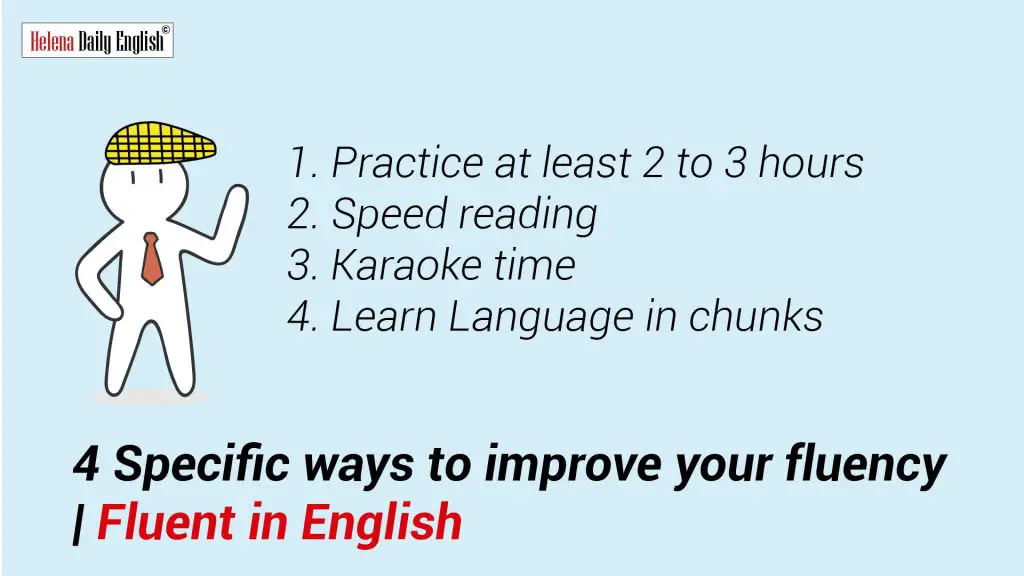
This post will focus on your fluency. I have received so many questions about speaking skills. And many of you are struggling with your fluency. You may learn grammar so hard and try to remember so much vocabulary, but it still takes you a lot of time to speak out a full sentence. Even sometimes you don’t know how to express your idea and your speaking is full of filler words like oh…um…I will help you to change this situation.
First, you have to understand clearly “what is fluency?”.
Many people misunderstand that fluency means you speak at a high speed, high speed is similar to high fluency. Sometimes, many people rely on your fluency to judge whether you say well or not. However, fluency is defined explicitly as the fact that you keep a steady pace of your speech without pausing or pausing for too long, no matter how fast or slow you speak. You can watch some of the president’s speeches. They usually speak quite slowly for everyone to follow, but there isn’t any problem with their fluency, right? So fluency’s keyword is not speed but stability.
Becoming fluent in English can take many years, but here are some tips to help you sound as natural as possible in speaking exams.
1. Practice at least 2 to 3 hours per week.
Every skill can be improved by practicing. You may be familiar with this advice, but I still need to emphasize it to you. You probably know it’s right, but you still hesitate to do it. Don’t worry because I have made a video to guide you to practice English speaking alone without being bored.
- Easy tips for improving your English speaking skill (IMITATION method)
- How to practice English speaking on your own
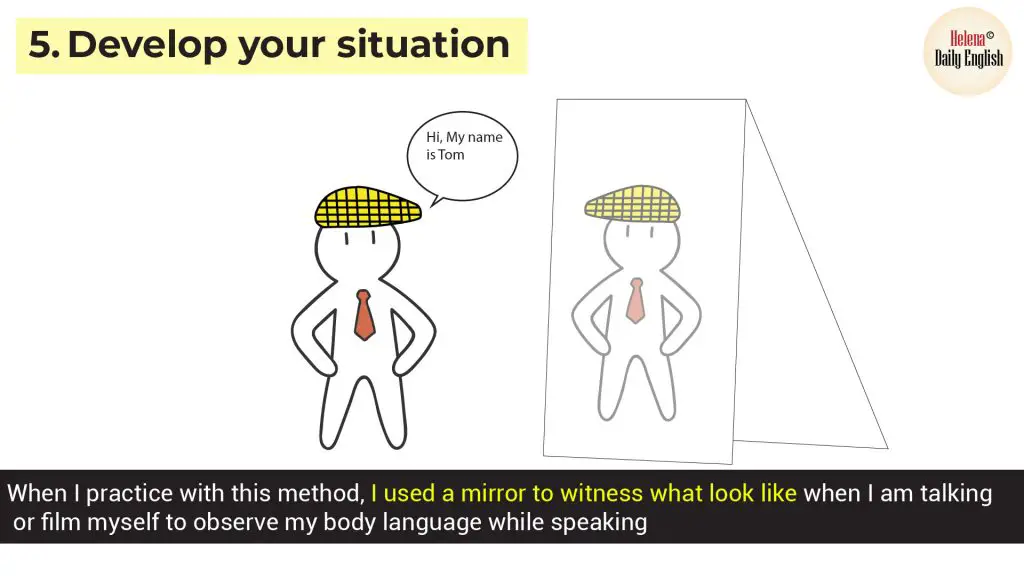
You should have a minimum of 2 hours of practice per week which is equivalent to about 15 minutes of speaking English per day.
2. Speed reading
You can choose any text for yourself. You need to make sure that the passage doesn’t contain too many new words. Read the passage and record yourself, measuring the time and speed of your reading. Then read the passage again. At each reading, try to break your record.
English is a language that requires you both physically, I mean you will need a flexible combination of your lips, teeth, and tongue to get the correct pronunciation.
Sometimes your difficulty comes from the fact that your native language doesn’t require as much of this combination as English. Therefore, this exercise will train your mouth to be more flexible with English sounds.
3. Karaoke time
Why don’t you take advantage of your favorite song to practice your speaking skills? Choose any song you like.

For example, I really love the song “My Heart Will Go On“
Then look for its lyrics. If you can’t find it, just type the name of the song, and add the lyrics behind it. The last thing to do is enjoy the melody of the song and sing along. This exercise is similar to reading text. However, the more difficulty lies in the fact that you will need to keep up with the speed of the song.
4. Learn Language in chunks
A fairly common mistake that reduces your fluency is that you learn single words. When you want to express a certain sentence, you will get the idea of your mother tongue in your head, and then you will try to translate them into English. This process will take you a lot of time. When there’s a word you don’t know, you’re stuck there.
If you learn by phrases, you will not encounter this situation. Let’s take some examples. When you try to say something like:
- I will come to visit you as soon as possible
- I highly recommend it to you
- She is getting tired of doing the same thing every day
If you try to learn by word, not by phrase, you have to translate:
- I/ will come/ to visit/ you/ as soon/ as possible
- I/ highly/ recommend/ it/ to / you
- She/ is getting/ tired of/ doing/ the same/ thing every day.
While if you learn in chunks you only have to remember:
- I will/ come to visit you/ as soon as possible
- I/ highly recommend it to you
- She/ is getting tired of/ doing the same thing every day
Can you see the difference? English speaking requires you to use the full phrase, not the individual word.
To be able to learn words in clusters, you have many ways. Are you thinking about collocations exercises? Actually, they can help you get a good score, but I’m not sure it will help you to improve your speaking skills. I learned phrases by doing shadowing exercises. This is actually a great exercise for us.
The post 4 Specific ways to improve your fluency | Fluent in English first appeared on Helena Daily English.]]>Today, I would like to share with you “How to Read a Book Effectively in just 5 steps”
[audioplayer file=”https://helenadailyenglish.com/wp-content/uploads/2022/11/5-steps-reading.mp3″]
All of us know that Reading an English book can bring a great benefit to your comprehension skill. However, keeping reading that book without giving it up is such a challenge. How many of you used to be excited to buy an English book with the thought: “Wow, I will finish it in one week, I will write down all the new works. My English will improve a lot”.
10% of those people can follow their plan, the others, 90% of people will forget the book after reading one-third or even just after 5 pages. If you are one of the 90% of people I mention, this article is for you. In this article, I will show you 5 steps to read a book effectively.
- Step 1: Choose the right material
- Step 2: Preparation
- Step 3: Read and take note
- Step 4: Find the confirmation
- Step 5: Retell the story
Now, let’s begin with step 1
Step 1: Choose the right material
First of all, you have to choose the right material. The books you choose must:
- Have the subject that you are interested in (most important)
- Have the same level as your reading ability

Choose the subject you like because it will make your reading effortless. Reading about things you like will help you to have more motivation.
Let’s imagine, if you don’t like history, but have to try to read a book full of historical facts. You will get bored and also give up quickly. You can read manga in English if you like comics. If you like romance, there are many good English novels for you.
You can even read the Harry Potter series if you want. Don’t try to force yourself to read academic books if you’re not interested in them.
Next, make sure that the book you choose is not too difficult for you. A book with too many words new to you will also discourage you from reading. To see if the difficulty of the book is suitable, please read the first 2 pages of the book and you will have the answer immediately.
That is the first step in how to read a book more effectively. Let’s move to step 2
Step 2: Preparation
Don’t get me wrong. You do not need to prepare too many things when reading English books. All you need is a dictionary and a pencil. I often use online dictionaries to make it easier to look up.
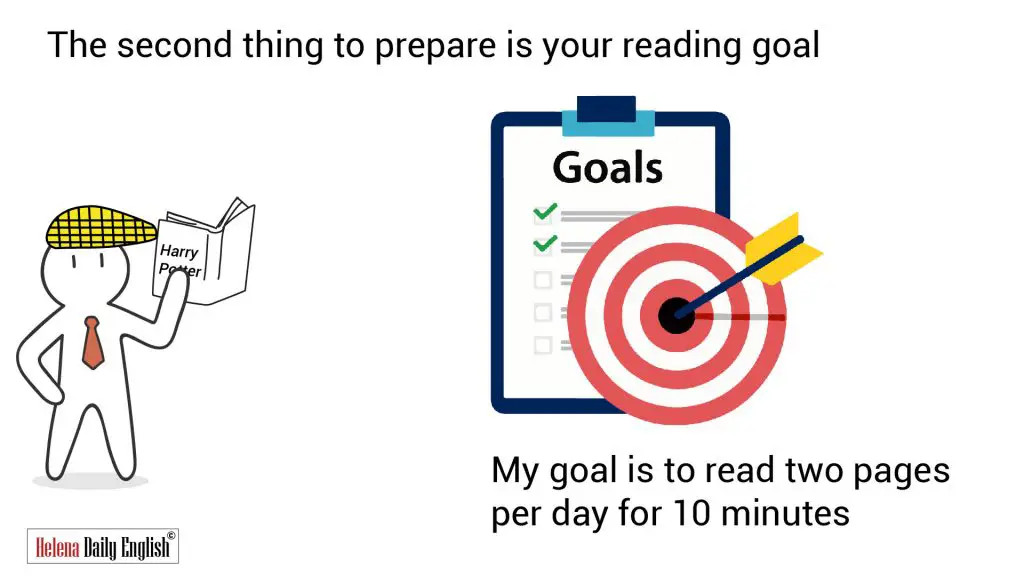
The second thing to prepare is your reading goal. A very common mistake is that we set our goals too high, for example: “I will spend only 1 week or 3 days to finish this book”. When the target is too high, your brain will react by not doing anything to avoid failure. Set goals that are close to your ability. You can even set a goal to read just two pages per day for 10 minutes. Remember, it is persistence that determines whether you make progress or not.
Remember: If you have no goals you will never get them
Step 3: Read and take note
You will read and write down the meanings of new words right into the book you read. However, don’t try to remember the meaning of every new word you come across. If that word is repeated in the book enough times, you will automatically memorize it without effort.
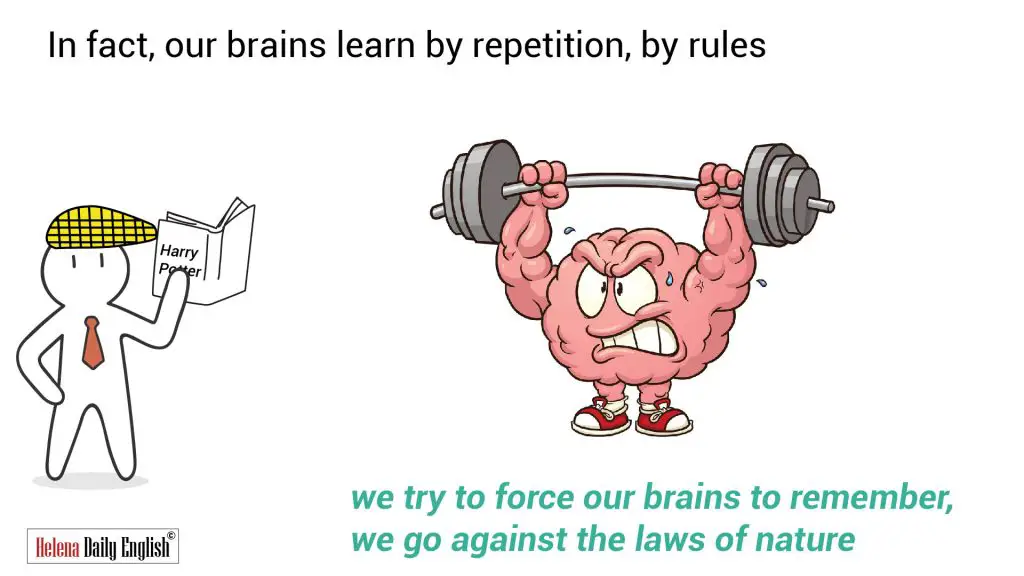
In fact, our brains learn by repetition, by rules as I mentioned in the article “How to improve English Reading skills by reading the bilingual book”
When reading a book, some of you will prepare a notebook to write down the words in the book for further review. However, I do not advise you to do so. As I said, if you want to keep yourself consistent when doing anything, you need to make it as simple as possible. If reading takes too much effort like taking notes of new words and trying to review them, it will be less likely that you will maintain your reading.
I will just use a single pencil to write down the meaning of the word right in the book, next to the word I haven’t known the meaning of. Remembering it or not will depend on how often the word appears. If the word appears enough times, your brain will automatically remember it without you having to work too hard. You can remember the meaning of the word if it is repeated at least 5 times.
Step 4: Find the confirmation.
This step is quite optional. You can do it or skip it. In fact, when you read a book, there will be times when you feel like you don’t really understand this part of this word. There are two ways you find yourself in this situation.
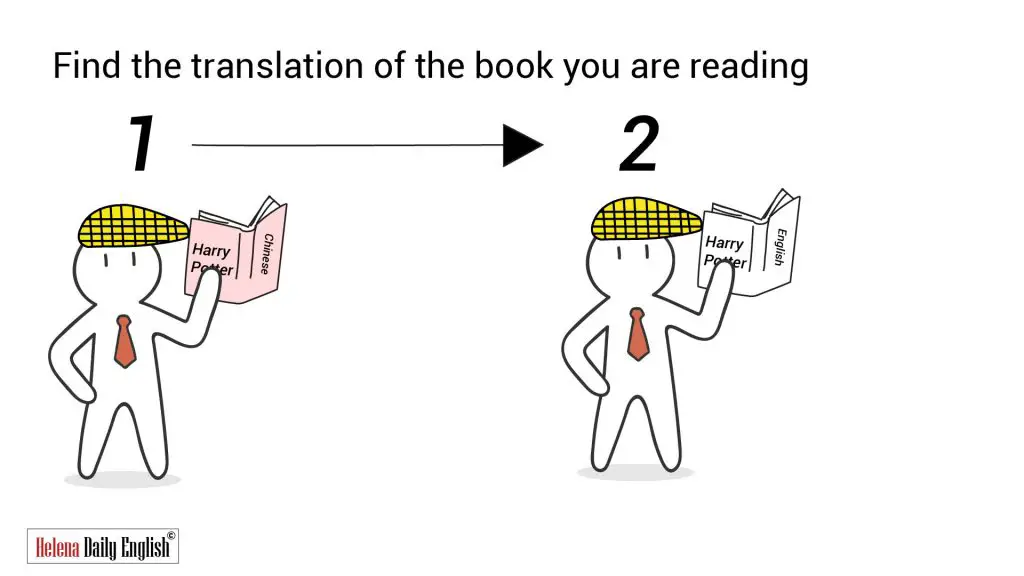
The first way, you find the translation of the book you are reading. This is not too difficult if you use google. For example, I read Harry Potter in English. If I were Chinese I would search for the “Harry Potter Chinese version“, and you would find a lot of translations. Famous books and novels will be translated into many different languages around the world.
Me, when I apply it this way, I can tweak it a little bit. I don’t start reading English right away. I will read a short paragraph of about 2-3 sentences in my first language first. After reading, I will try to memorize the content of that sentence before reading the English version. The feeling of reading until you understand it will really be very satisfying.
The second way is, Skip it. You guys just forget about it and don’t worry too much about that part. I believe that if you do well in step 1, choosing the right book for your level, encountering such passages will be infrequent. You can still understand the meaning of the story normally.
Step 5. Retell the story
Another thing I recommend you do is retell and paraphrase what you have just read. If you feel this is a waste of time, it is completely optional. However, this is a way that will help us make the most of the book. After about two pages or so, or after each important episode, I’ll stop for a moment and try to retell what I’ve just read. Or if you want to make it simpler, you can visualize those details in English.

You can refer to the method “IMITATION” that I share in this post “Easy tips for improving your English speaking skill”. It will help you how to retell in a creative way.
And I have shared with you in this article “101 Short Stories for learning English“. You should take a look at and find a suitable story for your interest and level
I have just shared with you how I read a book effectively including 5 steps:
- Step 1: Choose the right material
- Step 2: Preparation
- Step 3: Read and take note
- Step 4: Find the confirmation
- Step 5: Retell the story
You can refer to the method that I give, from which you can draw your own way of learning. I believe that your reading of English books will be easier. Let me know if you find it effective in your comment. I will see you in the next lesson.
VIDEO
The post How to Read a Book Effectively in just 5 steps first appeared on Helena Daily English.]]>Of the four skills of listening, speaking, reading, and writing in English, reading is the most challenging skill for learners
Are you expecting me to say so? No, reading is not the most difficult of the four skills of English.
English Reading skills do not require us to react as quickly as speaking, nor does it require us to be as precise in grammar as in Writing. On the contrary, reading is also the easiest skill to improve the 4 skills I just mentioned above.
You may think that there is no way to improve reading skills rather than reading a lot. Or do you think reading should be made more enjoyable? I agree.

However, how many of you have ever bought a novel in dense English, and then forgotten it after 3 days? So many people used to be like that too.
So now I will share with you my method of reading, which can help you make great progress after only two months.
To start, we need to prepare the “ingredients” first. It would be best if you had a bilingual book in English and your first language, a book written in two languages side by side. For example, English-Indian books, English-Russian books, and English-French books.

You also need a dictionary. The preparation is done, here’s how I practice reading.
First, use a dictionary to look up, and try to understand a passage in the book on your own. Remember, we will not use the French translation in this step. Which part do you understand, feel proud of yourself? If not, Please skip it temporarily.
Let’s take an example. I have a bilingual language paragraph here.
This morning, I looked at myself in the mirror of the bathroom sink. I have aged. The hair, the skin, the gaze. Above all the gaze and I asked myself if, over there, they will recognize me. I asked myself as well if it was worth the effort to go back on the road. There are so many things that have changed in eight years, starting with me. In spite of everything, I’ll have to sort out this old situation, if only to teach De Soto who’s the boss.
Ce matin, je me suis regardé dans la glace du lavabo. J’ai vieilli. Le poil, la peau, le regard. Surtout le regard, et je me demande si, là-bas, Ils me reconnaîtront. Je me demande aussi si cela vaut vraiment la peine de reprendre la route. Il y a tellement de chose qui ont changé en huit ans, à commencer par moi. Malgré tout, il faut que je règle cette vieille histoire, ne serait-ce que pour apprendre à De Soto qu’il n’a pas gagné la partie.
If you are a French trying to learn English, this is what you do.
Step one, forget about the French translation for a while. We will only be left
This morning, I looked at myself in the mirror of the bathroom sink. I have aged. The hair, the skin, the gaze. Above all the gaze and I asked myself if, over there, they will recognize me. I asked myself as well if it was worth the effort to go back on the road. There are so many things that have changed in eight years, starting with me. In spite of everything, I’ll have to sort out this old situation, if only to teach De Soto who’s the boss.
Try to understand the first part:
This morning, I looked at myself in the mirror of the bathroom sink. I have aged. The hair, the skin, the gaze. Above all the gaze and I asked myself if, over there, they will recognize me. I asked myself as well if it was worth the effort to go back on the road.
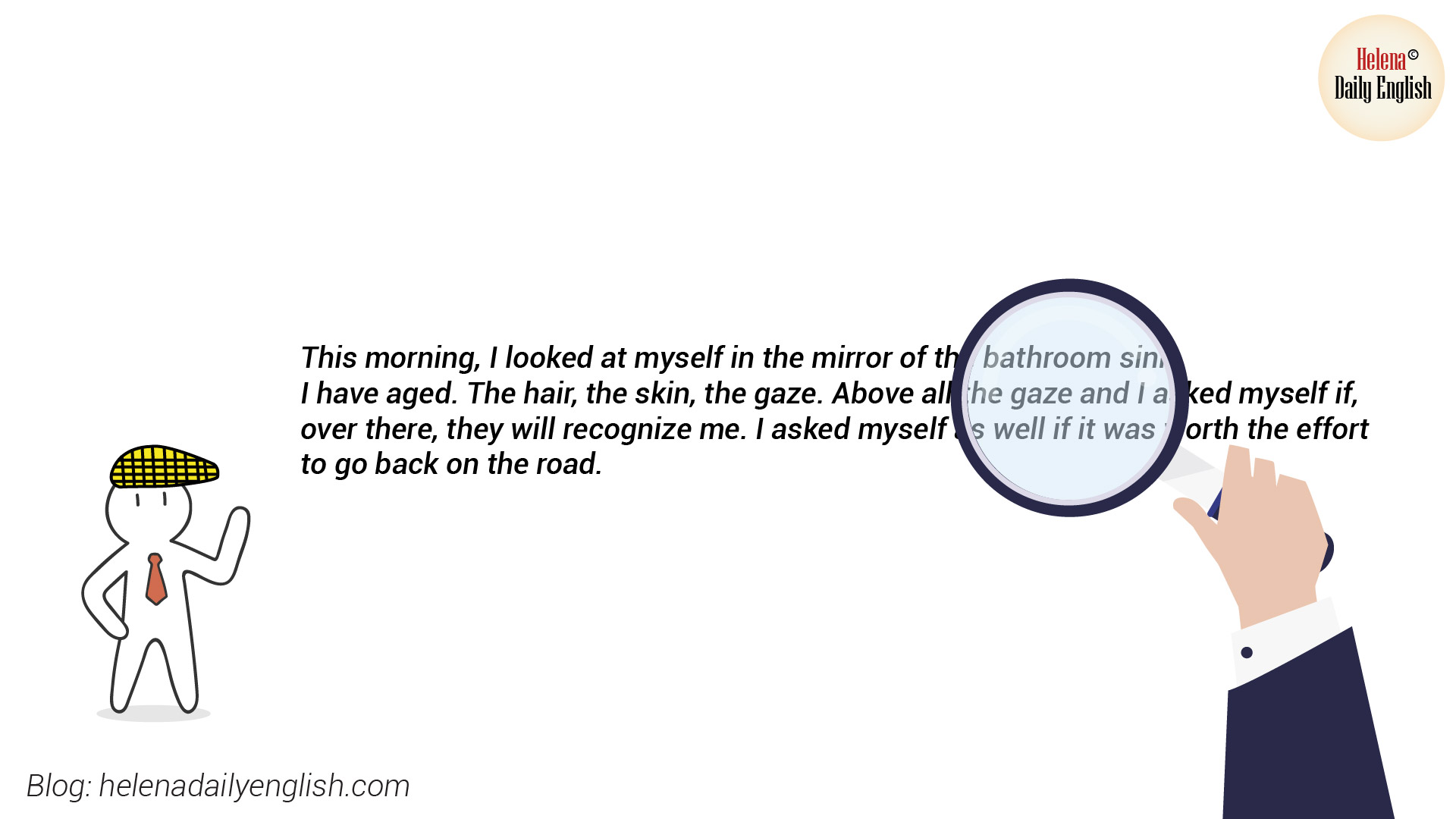
I believe this sentence, with a dictionary in hand, you will easily look up to understand its meaning.
After looking up all the new words, you may understand the general meaning of the sentence. This is the time when you use the translation provided in the book to make sure you have understood it correctly. Believe me, you will feel so satisfied when you see the use of words by professional translators. Their expressions will be very coherent. You will learn how to use words and expressions from linguists.
However, keep in mind that you need to try to understand the passage yourself before you see the translation. A bilingual book will outperform a regular English book, that is, whenever you feel you are not understanding a certain passage, you will immediately have an expert’s translation to compare. You will never misinterpret what the author means, this will help to maintain the reading” flow”.
Continue to the next part of the text:
There are so many things that have changed in eight years, starting with me. In spite of everything, I’ll have to sort out this old situation, if only to teach De Soto who’s the boss.
Like the first part, you should try to understand it on your own. Skip the phrase you don’t understand. For example in this text, the phrases “If only” or “sort out” may cause some difficulties for you. Guess its meaning according to the context or skip it.
And then, compare it with the translation in your book. It’s such an effortless thing to do, right?
Your grammar and vocabulary will expand naturally. You don’t have to try to take notes or mark anything. Reading books written in two languages like this will help you improve your language skills in the most natural way. In fact, our brains learn by repetition, by rules.
For example:
You see a house designed by an architect. Another time you see a house with a similar design created by him. Then again, you see a house of his with that design. So on the 4th time, when you see a house similar to the previous three, you will be able to recognize who created the building. That’s when the repetition is large enough, you will recognize the rules yourself without forcing your brain to memorize them

That is also how we acquire natural knowledge through bilingual reading. When you see a word or structure being repeated, you automatically remember them.
For Instance:
When you read the sentence
- She is beautiful
- beautiful: Adj
- is: Tobe
And another time you come across the sentence
- The city was so beautiful that….
- Beautiful: Adj
- was: tobe
Another time:
- You are beautiful
- Beautiful: adj
- are: tobe
Another time:
- We are beautiful
- beautiful: adj
- are: tobe
So after many times like that, you can conclude on your own that “tobe+adj” will be used to describe something.
That’s the mechanism of repetition-based learning
When we try to force our brains to remember, we go against the laws of nature. That’s why you find English so difficult.
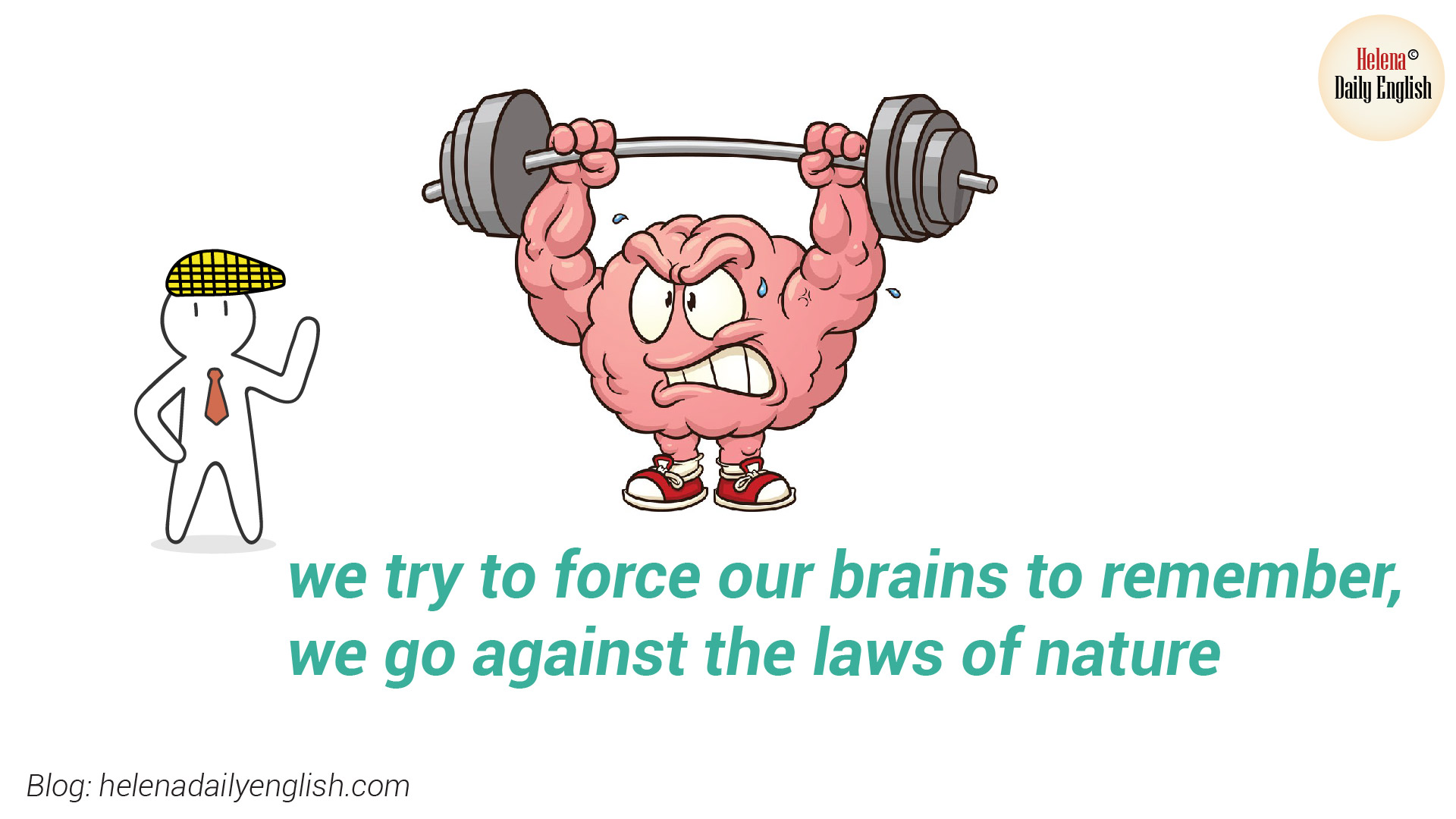
In short, in this post, I show you how to acquire a language in the most natural way through repetition. Applying this, you already know how I use bilingual books to read more effectively.
You will need a bilingual book on a topic that interests you, along with a dictionary. Repeat the steps of self-translation, then compare, self-translate, and then compare. You will find that your grammar and vocabulary skills will increase significantly. If you like this method, let me know. I will share with you more interesting methods for improving your English.
Read more: English for Beginners |5 Tips for self-study speaking English Naturally
The post How to improve English Reading skills by reading the bilingual book first appeared on Helena Daily English.]]>I’m sure that you often look up these keywords on Google search “English speaking practice“, “How to practice English speaking“, “English Speaking Tips“, or “how to improve speaking skill“…to find out a suitable method for your own. Today, I’m very happy to share with you 5 simple ways to practice speaking at home.
Foreign language learners will all know that Speaking is inherently a difficult skill to improve without practicing with other people. It would be great if we could practice with a native speaker, an English native speaker, or at least someone who can speak English better than us. However, not all of us can travel to the UK, or have enough time and money to take English courses at language centers. So let me share with you 5 English speaking tips to practice at home.
First, you need to remember that the “speaking” I am talking about here is not just “speak”. I want to mention complete communication skills including Reacting, Body language, Pronunciation, Turn-taking, Using formal or informal language, Articulation, and linking sounds. There’s a lot to practice, isn’t it? Don’t worry, the methods below are arranged in increasing difficulty so you can practice all the elements above.
-
Shadowing

The “Shadowing” Method has been so common and popular among language learners. This method is the advanced level of listening and repeating. You can use materials such as songs, short videos, or movies that you like. Then listen to the music or movie a few times and repeat what you hear. It’s not just the usual repetition, but you should always copy the way up and down the tone of the voice, the expression in that character’s voice, and the way the speaker uses connected speech. For example:
Listen: (0:00-0.15) https://youtu.be/dr1-fPkTxZM
And repeat: We live in a time-pressed culture. There is never enough time, and we see it, we feel it around us every day.
Try to copy as similar to the original speech as possible.
Such practice will help you a lot in learning natural communication phrases and especially in getting used to the rhythm of English. The practice of shadowing will help you get a more natural speaking. You can choose the short video from the movie
If you don’t want to repeat as similar as what you hear, try to this method “ IMITATION”. Have you ever heard about it?
For example, you will hear: I’m 18 years old and I still live with my parents. And you will repeat: She’s 18 years old and she still lives with her parents
For more detail: Easy tips for improving your English speaking skill
-
Review your own speech
An important skill of a self-learner is self-assessment and learning from one’s own experience. Therefore, in exercise 2, you should record yourself, then listen to it a few times to be able to self-assess your pronunciation.
For example, after the shadowing exercise, listen back to your practice and compare it with the original video. You will see your mistakes and improve a lot. For me, I usually use audiobooks. I often choose a book that I like, read each page aloud, and record it. Then I listened to the recording and compared it with the audio of the book itself. Trust me, you will be surprised at your progress.
-
Describe a picture
In exercise three, describe a picture, you will begin to develop your own ideas instead of relying on pre-existing scripts. Specifically, choose a picture and try to describe it in 3 to 5 5 sentences. For example with the picture below:

“There is a family of 4 dining together in this picture. The atmosphere of the meal is happy, everyone is smiling and talking to each other. There are many dishes on the table like chicken, french fries, and salad.”
You can even describe the small details in the picture. Regardless of how you describe it, the most important point of this exercise is that you try to keep yourself fluent and coherent when describing it. Exercise number 3 requires you to be able to articulate from 3 to 7 consecutive sentences in a coherent way. This is also the foundation to help you develop longer conversations in the future.
Find out: 3 benefits of learning English with pictures/ illustrations
-
Voiceover for a movie scene.

In this exercise 4, try dubbing a movie scene. Everyone will have their favorite movies or TV shows. So why don’t you use them for your English learning? You can watch a clip from your favorite movie 3 to 4 times, then try to summarize what it is about. Explain what you are seeing as coherently as possible. Then you mute the sound of that video and describe what you see when the video is playing. Here is an example
“It was a lovely day in the park. Mr. Tom and his wife Ms. May were sitting on a bench. suddenly, she remembered something and went back home. Mr. Tom was reading a paper. He was annoyed by the boy skateboarding next to him.”
This exercise will help you improve your communication reflexes. More importantly, this exercise also helps you practice using the past tense to tell a story or situation that often occurs in everyday communication. When dubbing the video, try to express the character’s emotions through your voice. Regular practice with this method will help you control your voice better and better.
Besides, you can refer to these articles where you will find a lot of tips on how to learn English with movie
- Learn English through Movies – 4 Tips, New method, and Tool
- 4 Steps to understanding a movie without subtitles
- Develop your situation

This exercise requires your greatest creativity, but it is also the exercise that gives you the most comprehensive progress. First, you’ll need to choose a setting, for example at a restaurant, an airport, a hotel reservation, or a job interview. Then play two roles in a conversation. Remember to record it then listen back to find out if you’re using the right language, formal or informal.
Do you have correct and clear pronunciation? Whether your tone of voice is up or down is appropriate for each situation. I have mentioned recording your practice many times in this video. I also know that hearing my own voice again isn’t always pleasant. However, this inevitable step will make your learning more effective.
One advantage of this exercise is that you can create thousands of different scenarios for yourself, so your practice will never be boring. When I practice with this method, I used a mirror to witness what look like when I am talking or film myself to observe my body language while speaking. Practicing this method, I used a mirror to witness what looks like when talking or filmed myself to observe my body language while speaking.
For example, I choose the situation of applying for a job to practice. I will go to google to search “The job interview question”, I can see thousands of questions I can use to practice
- Could you tell me about yourself and describe your background in brief?
I was up in a small town with few options. Because good schools were scarce, I began using online learning to keep up with the best. That’s where I learned to code, and it’s where I got my computer programming certification. After landing my first job as a front-end developer, I continued to devote time to learning both front- and back-end languages, tools, and frameworks.
Here are my suggestions for those who want to practice speaking English at home. These are all methods that I, along with many others, have used.
You can all refer to and modify them to become your own and most effective method for you. I believe that if you persist, you can improve your speaking skills within a month. Let me know your progress through the comments.
===============
The post How to practice English speaking on your own and at Home? – English Speaking Practice first appeared on Helena Daily English.]]>Hi guys, if you are reading this article, you are probably also having some difficulties with your speaking skills. So let’s see if you make any of the 5 most common mistakes below. Moreover, I will give you some ways to correct them, So come on, let’s get started
- The first common mistake: You focus too much on your grammar when speaking
Of course, accurate grammar will ensure the standard of your sentences and somehow prove that “you have learned English methodically“. Thereby your audience will be impressed. However, if you focus too much on grammar, which means you try to make sure your sentences are grammatically correct or use complex grammatical structures so that your sentences can be complicated, you may lose your fluency. Fluency is an essential factor in effective communication. If we can’t keep the flow in speaking, respond slowly to questions or hesitate too much, the listener will no longer want to listen to us no matter how complex and difficult our sentence structure is.
Let’s take an example
A: What do you think about the importance of higher education nowadays?
B. Oh, I think it becomes more and more essential. It will help us to get a well-paid job
C:…In my opinion,….um…..Only by ……entering university,…..can the ……the number of…….job opportunities for us………definitely…..increase.
Obviously, you’ll want to talk to B more than C, right? So don’t worry about grammar so much that you forget your fluency. Small grammatical errors won’t make a big difference to your sentences
2. The second common mistake: You speak too fast
Do you think that fast speed equals high fluency? The faster you speak, the more you will sound like a native speaker.
No, it’s not. Speaking quickly does not mean good communication, but speaking clearly and coherently, ensuring that the listener understands what you are saying is really an effective communicator. In addition to that, speaking too fast can cause you to make pronunciation mistakes.
In fact, some of the most impressive orators in English speak very slowly with frequent pauses between words and sentences. Barack Obama, for example, is acknowledged to be a great orator. If you listen to Obama speaking, he speaks very slowly and frequently pauses, almost as if he is searching for just the right word. He also doesn’t hesitate and falls back into ‘um’, or ‘uhh’, filler words.
- How to Speak English Fluently like American Speakers in 1 Month – Part 1,2
- Idioms in English | 6 Idioms topics in daily life
- English Conversations in Real Life with common Phrases (Meaning & Example)
- 5 Tips for self-study speaking English Naturally
3. The third common mistake: You’re waiting for the perfect version of yourself
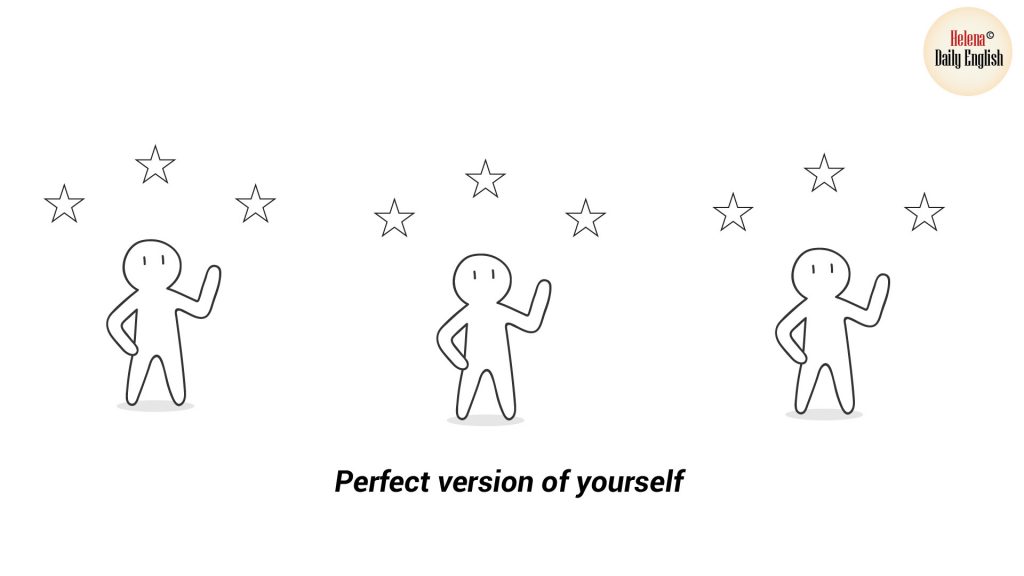
You want to speak in front of a crowd, you want to enter a speech contest. But wait, you need to wait until your pronunciation is better, you are not confident with it right now. And just like that, you wait from day to day, wait until you are really good before taking part in a competition, speaking in front of the crowd.
However, the day when you become perfect will never come. You will never be satisfied with your abilities. Self-doubt will cling and keep you from making progress. The solution is to remember that mistakes are inevitable. No matter how many mistakes you make, you can at least be proud of yourself for having the courage to speak to a native speaker, and take part in an English-speaking contest instead of waiting for the perfect version of yourself and doing nothing
4. The fourth common mistake: You judge your progress against other people’s
Comparing yourself with other learners is inevitable, but you shouldn’t let that comparison generate negative emotions in you. Learning English is not a race and everyone has their own goals and methods. What works for them may not work for you. Don’t feel pressured to follow all the methods you learn online without knowing if they really work for you. It makes no sense to judge yourself by someone else’s yardstick.
5. The fifth common mistake: You don’t practice consistently
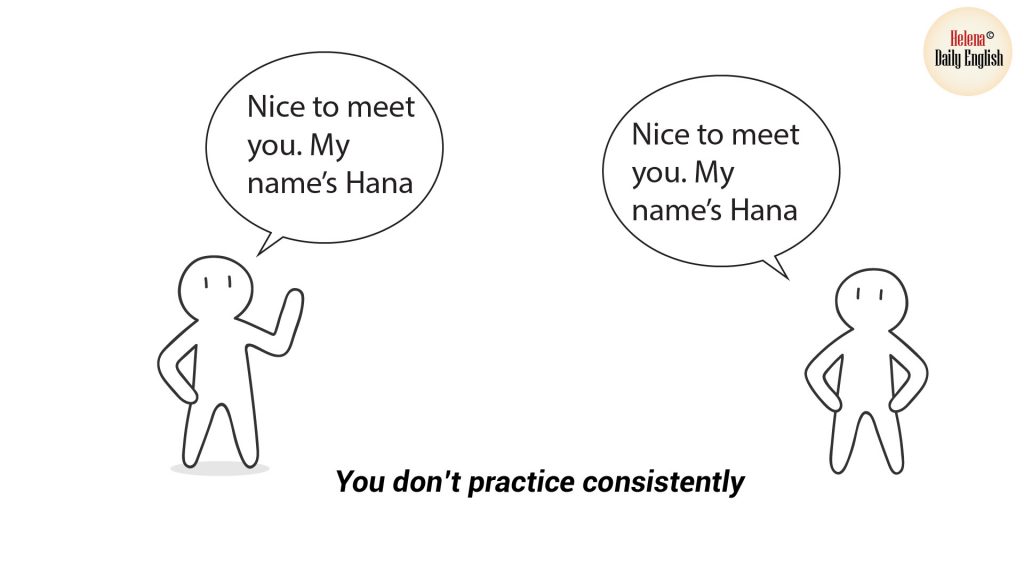
Here I want to emphasize the continuity of practice. Maybe, you feel like you need to improve your listening and speaking skills, you go on the internet and search a lot of methods and then “frantically” rush into practicing for 4 hours.
You feel full of enthusiasm at that moment. However, you will not be able to maintain such learning. You forget to learn to speak until a few months later, you find that you haven’t made any progress, you feel regret and decide to study again.
You continue to go online to look up methods and study again for 4 hours. This goes on and on and your learning stays the same. The solution here is not focusing on how long you practice, you need to keep practicing as regularly as possible. Just 5 minutes of practice every day will be much more effective than studying for hours and forgetting it the next day.
Those are the most common mistakes in English of non-native speakers. Have you encountered such errors?
The post Common Mistakes in English Speaking | 5 Mistakes you should avoid first appeared on Helena Daily English.]]>